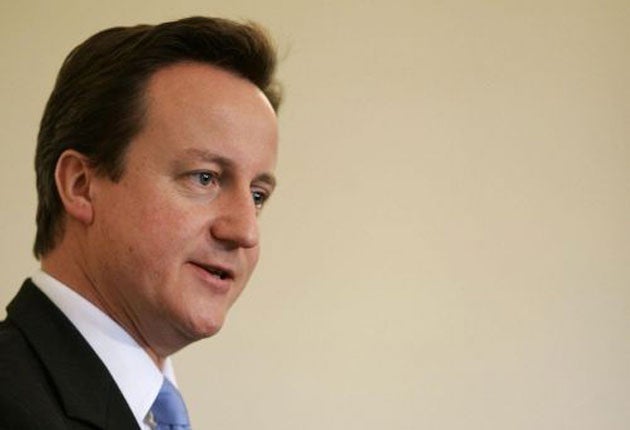Cameron wants election to decide recovery plan

Britain is at a "fork in the road" with a choice between Labour's "borrowing binge" and a Tory government that would try to halt Labour's tax rises, David Cameron said yesterday.
The Conservative leader tried to regain the initiative amid jitters in his party that Labour's claims the Opposition would "do nothing" about the recession have hurt his opinion poll ratings.
In a speech at the London School of Economics, Mr Cameron said Labour's "reckless" borrowing and "spend now, forget the future" policy could slow the economic recovery. The Tories would cut Labour's public spending plans from 2010, he said, even though the Chancellor, Alistair Darling, had already announced a squeeze on previous figures in last month's pre-Budget report.
He challenged Gordon Brown to call an immediate general election so the public could make their choice between the very different economic policies on offer from the two parties.
Answering questions afterwards, Mr Cameron said: "We are at a fork in the road. Either we go ahead with this borrowing binge – an additional £20bn I don't think we can afford – to cut taxes that I don't think will stimulate the economy, because people know a further tax increase is coming down the line. Or we can take a different path and say let's recognise how the world has changed, how broke we are in Britain and that we've got to get the public finances back on to a sustainable footing."
He stopped short of promising that a Tory government would prevent Labour's planned tax rises: "Our priority should be to try to get spending on a path where we can avoid those tax increases. We must put the interests of low-income families first but we recognise we are living in a very difficult situation. I don't want to make promises I cannot keep." The Conservatives had already identified savings that could be used to freeze council tax, he said. Although Mr Darling cut the planned rate of growth in spending in 2011-12 and 2012-13 from 1.8 to 1.2 per cent, Mr Cameron said even that was unrealistic and would hinder growth for years.
"I know that opposition leaders always call for an election but I think we really need one. None of this was in Labour's manifesto, and they are asking people to go ahead with a borrowing binge now that is going to load up taxes and debt for future generations."
Ministers dismissed Mr Cameron's call for an election as a "smokescreen".
Mr Brown said: "I believe there is a very clear dividing line between those who do nothing and simply let people suffer and what we are determined to do, which is to help people through these difficult times.
"We are taking bold decisions. The alternative of letting the recession take its course is one that we will not allow to happen. We will take action, working with our European and international partners at every point."
The economy: Tory leader's claims evaluated
Cameron Claim #1
"Discretionary borrowing now... may even make the recession longer and deeper"
Verdict: Half right. Yes, higher borrowing will make the recession longer, and the recovery weaker. Taxes will undoubtedly be higher from 2011, even for those earning as little as £20,500 a year. That will indeed depress demand and consumption and slow the recovery, which will be anaemic anyway because it will take so long for the banks to come back. But the recession will not be deeper; most economists put the boost to GDP from the Chancellor's plans at about .2 percentage points next year. The Government (and the Bank of England) is gambling on action now to avoid a full-blown slump and deflation, because experience in the 1930s and in Japan more recently show that would be virtually impossible to break out of.
Cameron Claim #2
"We need exceptional policies to get credit moving again... That's why we have proposed a National Loan Guarantee Scheme."
Verdict: Mr Cameron is right to point to the failure of the credit system as the most important factor in the gathering recession, though the general collapse in demand is fast overtaking it, so the demand for, as well as the supply of credit is shrinking as confidence evaporates. But the National Loan Guarantee Scheme is potentially even more statist than Labour's schemes. Would a Cameron government determine which companies live and which die in this recession?
Cameron Claim #3
"A credible long-term plan for controlling public spending has three components. First, reducing the demands on the state by fixing our broken society. Second, increasing the productivity of the state by reforming our public services. And third, cutting government waste."
Verdict: Open. It is all true, but also precisely what Tony Blair and Gordon Brown said that New Labour would do before 1997; there is insufficient detail on why Mr Cameron would do any better.
Sean O'Grady, Economics Editor
Join our commenting forum
Join thought-provoking conversations, follow other Independent readers and see their replies
Comments
Bookmark popover
Removed from bookmarks